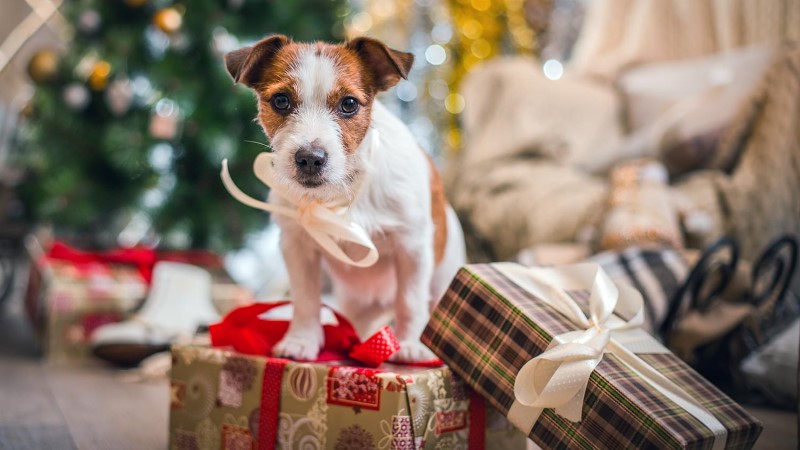Pets are part of the family and add to the joy of holiday celebrations, but all that tail-wagging fun could lead to mischief, so manage your household to ensure the safety of your pets. With the help of the techniques mentioned below, you and your furry friends are headed for holiday bliss!
Keep Dangerous Foods and Drinks Away from Pets
Make sure your pet does not sample any eggnog, spiced apple cider, or other holiday beverages! Canine and feline kidneys are unable to effectively process even small amounts of alcohol. In addition, avoid giving your pets bones and fatty foods, such as turkey skin or rich foods. Bones may splinter and fatty foods may cause gastrointestinal (GI) upset, such as loose stool or even pancreatitis, which is inflammation of the pancreas. Have your pet stick to their normal food or these safe treats during the holidays.
Decorate with Pet Safety in Mind
Keep in mind that holiday decorations might be toxic! Here are a handful to watch out for:
- Dangerous plants. Avoid keeping toxic plants like holly, mistletoe, and poinsettias at pet-height (a height that could be reached by your pet).
- Candles. Do not put certain decorations – especially lit candles – at tail-wagging or nose-bumping height. Use battery-powered candles instead of real candles.
- Contaminated water. Ensure your pet does not have access to the holiday tree’s water. Often, tree water is contaminated from fertilizers and drinking that water could be harmful.
- Tree safety. Consider the best way to safely keep a holiday tree in your home. Do you need to anchor the tree so that a nimble cat does not tip it? Should you use shatterproof ornaments? Should you put your tree in a play-pen or x-pen (an x-pen is basically a play pen for pets)? Also, skip decorating the tree with tempting food items, such as popcorn and candy canes.
- Lighting. Make sure that holiday lighting cords are out of the way of curious snouts and fuzzy paws that could become tangled.
Train Your Houseguests
Your houseguests may not be used to having pets around or may be used to pets that have a different “reach” or “desire” to explore belongings. A friend who owns Corgis may be able to keep chocolate on their counter at home, but your friend with a Labrador probably does not keep anything potentially yummy at counter height! Your cousin with a senior dog may not be used to thinking about your exuberant puppy that is still working on eliminating their door bolting habit. What should you do?
- Keep bathroom and bedroom doors shut. Ask your houseguests to close bedroom and bathroom doors to ensure that your pets do not have access to any toiletries or medications that may make them ill. You could also use baby-gates to section off your house.
- Close exterior doors. Remind houseguests to take extra care to close exterior doors and to ensure no pets “escape” when guests are entering and exiting your home.
- No feeding from the table. Request that guests do not feed your pets any table scraps or other items. If a guest wants to spoil your pet with a special treat, suggest that they offer some treats your pet and their stomach are already used to.
- Keep a “clean counter” policy. Request that food is not left on counters or tables unattended unless your pet is secured (in a crate or different room).
Sort and Secure Gifts
Ask guests to not put gifts that contain food under the tree or consider not putting any gifts out until it is time to open presents. This may prevent your curious pooch or kitty from ripping open (and then ingesting) a present that contains chocolate or other hazardous materials. You could also keep all presents and food-related items in a separate location, such as a closet or a spare room, until it’s time for unwrapping.
Finally, consider having your pet on a leash during gift opening so they do not sneak into someone’s opened gift pile for a snack or play session! An alternative to having your dog on leash during gift opening is having your pup on their mat during the event. See this blog for how to teach your dog to go to their mat.
Manage Your Pet
Consider working on training before the holidays so your dog or cat knows a few key cues. Put pets in a safe bedroom when you cannot watch them or crate your dog for a few minutes while you get a handle on a bustling situation, such as arriving houseguests. If you can’t watch your pets, it’s okay to manage the situation with containment or even by tethering your pet with a leash to your waist.
Be Prepared for the Unexpected
Considering pet safety before the holidays is the best way to ensure it’s fun and safe for everyone. Get pet insurance coverage through AKC Pet Insurance (underwritten by Independence American Insurance Company) for your pet now to prepare for unexpected accidents and injuries.
Enjoy a safe and festive holiday with your human and four-legged family!
,

